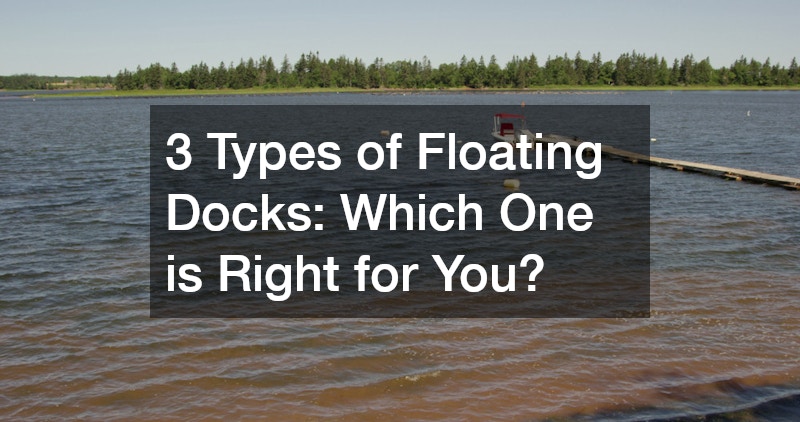
Choosing the right type of floating dock is crucial for anyone looking to enhance their waterfront property. With so many options available, it can be overwhelming to decide which type will best meet your needs. Floating docks provide flexibility and adaptability in a variety of water conditions, including lakes, rivers, and coastal areas. In this article, we will explore different types of floating docks and help you determine which one is right for you.
Video Source
By the end, you will have a better understanding of the various options available for your new dock.
Traditional floating docks are typically made from wood or plastic and are supported by buoyant materials such as barrels or foam. These docks offer stability and are often preferred for residential and small commercial applications. One of the biggest advantages of a traditional floating dock is the ease of installation; they can often be buoyant enough to handle small boats without excessive maintenance. However, wood docks may require regular maintenance to prevent rot, especially in harsh weather conditions. If you are looking for a classic dock that can accommodate a range of watercraft, a traditional floating dock might be the right choice for you.
Another consideration with traditional floating docks is their versatility in design. Homeowners can customize the layout based on their usage needs, whether for fishing, boating, or simply enjoying the water. Additionally, these docks can often be expanded to accommodate larger vessels or additional features like seating areas or fish cleaning stations. It’s also worth noting that a traditional floating dock can be a lifetime solution if properly maintained. This makes them a popular choice among marina operators due to their long-lasting performance.
Aluminum floating docks are becoming increasingly popular due to their lightweight, durable, and rust-resistant properties. They are ideal for both saltwater and freshwater environments and often have a longer lifespan than traditional materials like wood. The lightweight nature of aluminum also allows for easier installation and reconfiguration, making it simple for owners to adjust their docking arrangements as needed. Furthermore, aluminum docks are generally easier to clean and maintain, adding to their appeal. If you’re looking for a low-maintenance option, an aluminum floating dock may suit your lifestyle.
In addition to their durability and maintenance benefits, aluminum floating docks can be designed in various configurations to meet a variety of needs. Homeowners and business operators appreciate the ability to configure their docks into multiple shapes, accommodating multiple boats or activities at once. Many aluminum docks also feature modular designs, allowing you to add or subtract sections as your requirements change over time. Customization and modularity also mean you won’t have to commit to a specific use; the adaptability of aluminum docks can evolve as your needs change. This flexible approach makes aluminum docks an attractive choice for those who love water activities.
Specialty floating docks serve very specific purposes, such as for marinas, commercial fishing, or even yacht docking. These docks often come with additional features like heavy-duty mooring capabilities and reinforced structures for stability in rough conditions. Frequently built from composite or industrial-strength materials, they are designed to handle the demands of heavier usage. They provide solutions for various recreational and commercial boating needs and can often withstand challenging marine environments. If your waterfront property requires more than a standard dock, a specialty floating dock may be your ideal choice.
Furthermore, these specialty docks often incorporate modern technology to enhance usability and safety. Features like adjustable height mechanisms can accommodate changing water levels, ensuring that your dock remains accessible year-round. Some designs even allow for integrated lighting and power sources for those who may want to spend longer hours on the water. This level of innovation is perfect for boaters who require more than just a place to moor their vessels—they need functional, sophisticated structures that meet multiple needs. Choose a specialty dock if you’re seeking to maximize both functionality and elegance in your waterfront experience.
When it comes to selecting the perfect floating dock, your choices significantly impact usability, maintenance, and overall enjoyment of your waterfront property. Traditional floating docks offer stability and a classic appearance, while aluminum docks bring durability and ease of maintenance to the table. For specific needs, specialty floating docks can provide solutions that meet heavy-duty requirements and modern capabilities. Your choice should align with your specific needs, budget, and long-term goals. Careful consideration of these options will ensure you acquire a dock that not only fits your immediate needs but also serves you for years to come.
